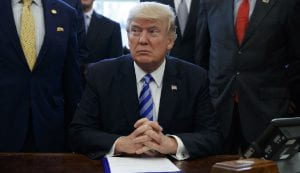BY COLLEEN COYLE – STAFF WRITER
Over the past week as Centre students sunned themselves on beaches or enjoyed quality time with their dogs and Netflix, the GOP suffered defeat at the hands of their own party as they attempted to repeal and replace the Affordable Care Act, more widely known as Obamacare. The failure to replace Obamacare reflects an inner-turmoil within the Republican party as moderates and radicals opposed the bill for different reasons. Throughout the process, Donald Trump threatened, demanded, and pressured lawmakers to fall in line but was unsuccessful in collecting the number of votes necessary for the bill to pass. The failure to repeal Obamcare raises critical questions about if the GOP will be able to come together on other more divisive issues and leaves Obamacare enrollees uncertain about how long they will continue to have health care.
The bill did not even see a vote, pulled by Paul Ryan before it could go to the house floor Friday morning. Paul Ryan on Friday admitted defeat, stating “Obamacare is the law of the land for the foreseeable future,” a remarkable statement coming from a party that has vowed to repeal and replace the Obama-era healthcare system since its creation. Ryan’s admission was echoed by President Trump who took swipes at House Democrats as he laid blame for the failure, lamenting the fact that the American Health Care Act had zero Democratic support.
 However, with a Republican-majority Congress, the question isn’t why didn’t Democrats help, but why did Republicans need them? The simple answer is that just because the government is being run by Republicans the fractures that erupted in the party before Trump’s election have not disappeared. On the far right you have the Freedom Caucus, a group of representatives who felt that the American Health Care Act didn’t go far enough in repealing Obamacare, conversely you have moderates who felt that the changes demanded by the Freedom Caucus would alienate their moderate constituents. The Freedom Caucus is a group of hardline conservatives who felt the bill failed to eliminate mandates which drove up premiums. In contrast, moderates refused to eliminate popular parts of Obamacare, including the mandate of treatment for pre-existing conditions.
However, with a Republican-majority Congress, the question isn’t why didn’t Democrats help, but why did Republicans need them? The simple answer is that just because the government is being run by Republicans the fractures that erupted in the party before Trump’s election have not disappeared. On the far right you have the Freedom Caucus, a group of representatives who felt that the American Health Care Act didn’t go far enough in repealing Obamacare, conversely you have moderates who felt that the changes demanded by the Freedom Caucus would alienate their moderate constituents. The Freedom Caucus is a group of hardline conservatives who felt the bill failed to eliminate mandates which drove up premiums. In contrast, moderates refused to eliminate popular parts of Obamacare, including the mandate of treatment for pre-existing conditions.
This divide was enhanced by the Congressional Budget Office report that indicated the American Health Care Act would remove insurance coverage from 14 million people by next year and would likely increase premiums for Americans. This report raised questions about how President Trump would reconcile the bill with his campaign promise to repeal and replace Obamacare with something that was even better and would provide coverage to more Americans. Some argue that the bill hurt Trump supporters perhaps some more than others, as his constituency is made up of conservative rural voters who did benefit from Obamacare. Kentucky, which voted overwhelmingly for President Trump, would have suffered from an Obamacare repeal, as conservative Kentucky was a success state for Obamacare.
The failure of the bill had many wondering if Republicans would redouble their efforts to repeal Obamacare but President Trump made no indication that he would push for legislation regarding the issue in coming weeks. Instead the White House intends to focus on tax reform, a complicated and divisive issue which will certainly face the same challenges that the American Health Care Act did. Most political pundits are not optimistic about the chances tax reform has of passing but tax reform was a cornerstone of Trump’s campaign isn’t likely to be ignored.
The coming weeks will reveal whether the Trump administration will be capable of either bypassing the Freedom Caucus or allying with them to pass legislation. The internal turmoil of the Republican party was not solved by Trump’s election and the failure of the American Health Care Act has provided distraction as scrambling Democrats also transition to a new role, from a governing party to an obstructionist one. Much will be determined by which party can pull itself together and become an effective force to achieve voter mandates, but it remains unclear whether Democrats or Republicans will get there first.
